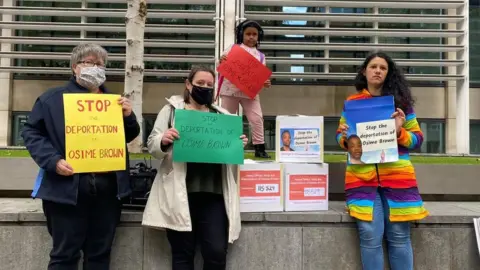Bid to stop deportation of autistic Dudley man
 Family handout
Family handoutMore than 100,000 people have signed a petition to spare a man with autism from deportation.
Osime Brown, 21, faces being returned to Jamaica, which he left at the age of four, due to a 2018 conviction for robbery.
Joan Martin said her son could not understand deportation and asked her which bus he would need to catch from Jamaica to visit her at home in Dudley.
The Home Office said Mr Brown's case would be "for the courts to decide".
Minister Kevin Foster cited the UK Borders Act of 2007 which says "foreign criminals" are subject to automatic deportation. However, campaigners for Mr Brown say he has no support network in Jamaica and would not cope.
 Family handout
Family handoutMr Brown was jailed for the robbery of a phone from a teenager, attempted robbery and perverting the course of justice.
His lawyers have expressed concern about the role of the joint enterprise law in the case. It was often used in gang cases as it allowed for group culpability for crimes.
However, it has been criticised as a "lazy law", with a large proportion of those convicted being young black and mixed race men.
 Family handout
Family handoutMs Martin said her son had been self-harming in prison, from where he is due to be released this week, adding "everything is draining from him".
"I have to be honest with him, I said if they deport you, you can't come back," she said. "He looked like the light when you turn it off."
Sarah Ricca is one of Mr Brown's solicitors and said his case had "struck a chord" with people.
 Family handout
Family handout"It's very hard not to be concerned that the system now grinds away and fails to take proper account of his particular condition and the particular risks it poses," she said.
Ms Martin said her son had fallen through the cracks and been let down by the government throughout his life.
"To offload him to another country without helping him would be cold."

Follow BBC West Midlands on Facebook, Twitter and Instagram. Send your story ideas to: [email protected]
Amendment 8 October 2020: This story has been updated to make clear lawyers' concerns about the role of the joint enterprise law in the wider court case and to specify details of Osime Brown's convictions.
